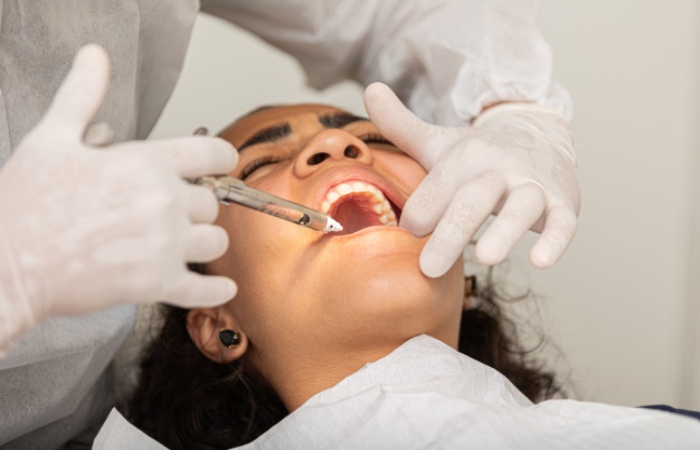Tooth Sensitivity: Toothache is one of the most common reasons a person visits a dentist. A common cause of dental discomfort is sensitivity. In this article, you will learn what tooth sensitivity is, the most common causes, and how to prevent it.
Dentin sensitivity or tooth sensitivity is a common condition that affects approximately 25% of the population. It is characterized by intense and short-lived pain. Occurs as a reaction from the inside of the tooth to an external stimulus such as cold or heat, sweets or acids, or even touch, pressure or brushing. It disappears when the irritant stops acting on the tooth. If the discomfort is excessive, lasts more than 5 seconds, and does not disappear, it is advisable to consult a dentist.

Table of Contents
Causes Of Tooth Sensitivity
The two most mutual causes of tooth sensitivity are:
- The loss of enamel.
- The gingival recession or gum recession.
As a result, the dentin, which is the inner part of the tooth, is exposed. Normally, dentin is usually protected by the enamel in the crown area and gingiva in the root area.
What Is A Tooth Like?
A tooth can be separated into two parts:
- One is visible, the crown
- The other is not visible. It is located inside the bone and surrounds by the gum, that is, the root.
Enamel is the hardest layer that covers the crown and protects the tooth.
Dentin is the second stratum of the tooth. It is soft, porous, and has tubules that come into contact with the tooth’s nerve. When these tubules are exposed for various reasons, a nerve impulse arises that generates sensitivity.
The pulp is the beneath of the tooth. What we call nervous. It contains cells, blood vessels, and nerve fibres.
How Does Tooth Sensitivity Occur?

The process of hypersensitivity occurs when a tooth, after a toxic stimulus, tries to protect and create healthy or reactive dentin to protect the nerve. The ability of our teeth to recover from trauma is reduced:
- With age.
- With repeated fillings.
- When the injury is closer to the nerve.
In addition, with large cavities, old and deep fillings, the risk of hypersensitivity increases.
Sensitivity occurs most frequently between the ages of 20 and 30. After age 40 it decreases, because the diameter of the dentin tubules is smaller, which reduces the movement of the fluid that causes sensitivity.
Reasons Why The Dentin Can Be Exposed
There are different reasons why the dentin can expose and, consequently, cause sensitivity in the teeth:
Mechanics
- Bruxism: Grinding or clenching the teeth. Causes enamel erasure (exposes dentin). It also causes the gums to retract (exposing the root), even creating a hole (tear) in the root area due to excessive stress on the tooth.
- Strong and improper brushing: can cause receding or retraction of the gums, exposing the tooth’s root. Choose a medium-hard brush, use up and down sweeping strokes (horizontal strokes around the root are not recommended), and do not use excessive force. Not brushing your teeth also causes the gums to sag because when plaque builds up, gingivitis occurs first, which, if worse, causes periodontal disease, in which the gums eventually retract.
- Attrition: The contact from one tooth to another leads to gradual loss of the tooth and can also be due to an incorrect position of the tooth.
- Abrasion: This occurs when foreign objects (needles) enter the mouth through hooks in removable dentures, which trap more food than normal, producing acids that wear down the hook area.
Chemicals
- Teeth whitening: products that contain abrasive substances that penetrate the enamel to the dentin and cause temporary sensitivity. A sensitivity treatment recommends when using bleaches. In addition, extraordinary care is taken when using these bleaches under a dentist’s supervision, Cause burns or alterations in the mucous membranes.
- Drinking or eating acidic or sugary foods: citrus fruits such as lemon, soda, ice cream, candy, vinegar, alcohol, coffee, low pH foods can cause sensitivity.
- Gastrointestinal problems: Nervous diseases with repeated vomiting or diseases that cause heartburn and reflux, which cause wear of the teeth by stomach acids.
- Erosion or corrosion due to environmental factors: In some professions exposed to acids, enamel wear can occur.
- With medications: With long-term treatments or with high doses, with medications. The enamel can wear out.
Thermal
- Hot or cold food
Others
- Cracked teeth: Caused by blows or chewing forces that cause sensitivity.
- Periodontitis: It’s a disease of the gums in which the inflammation caused by the accumulation of plaque causes them to retract, exposing the root and causing sensitivity.
- After professional hygiene: The removal of tartar adhering to the teeth can expose the roots and cause hypersensitivity. But this does not uncaring that you should interrupt hygiene, as this is the only way to remove tartar and prevent receding gums.
- By caries or removal of cavities: if the caries is enamel, it usually does not give symptoms, but when caries reach the dentin, palpation begins. After removing caries and filling, an increase in sensitivity may occur due to irritation of the nerve branches in the dentin and because the material, hardening, shrinks, causing an internal load on the tooth. This sensitivity can last for hours, days, or even months after filling or refilling.
How To Prevent Tooth Sensitivity?

Following some simple tips can help us avoid this annoying situation:
- Consult a dentist who can determine the underlying cause of the pain.
- Use moderately abrasive toothpaste.
- Control your diet and avoid excess foods or acidic, sugary drinks with a dangerous Ph.
- Ask a hygienist to help you redefine your brushing technique.
- Don’t brush your teeth after drinking bitter beverages.
- Use dental floss or interdental brushes.
- Avoid sudden changes in temperature while eating.
- Do not put objects that can erase your teeth (toothpicks, needles) in your mouth.
- If you are grinding your teeth (bruxism), apply a splint.
- In the office, fluoride applied to sensitive areas to strengthen enamel and reduce sensitivity.
- Gum grafts perform surgically if the gum is lost to protect the exposed root.
- Root canal or endodontic treatment when tooth sensitivity is very high and other treatments do not work.






